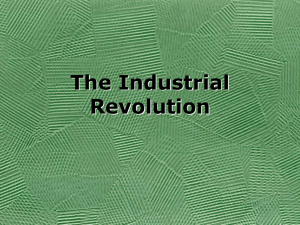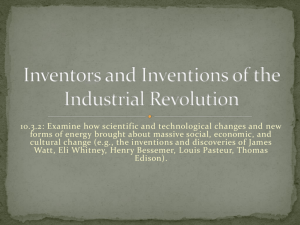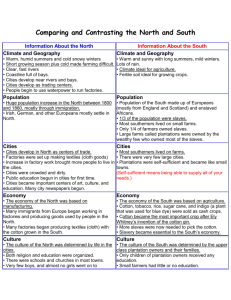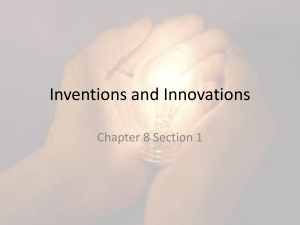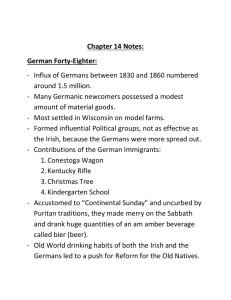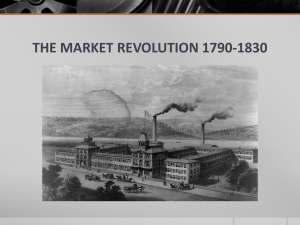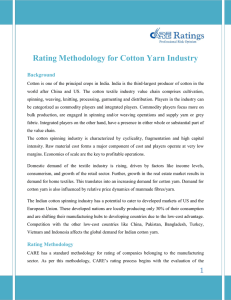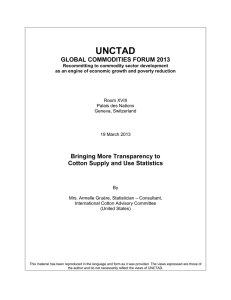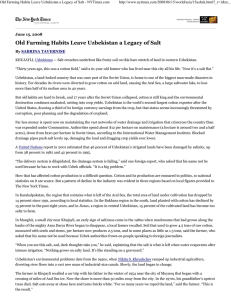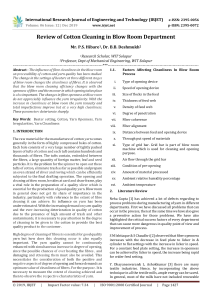Changing Europe Information “Historians are now agreed that
advertisement
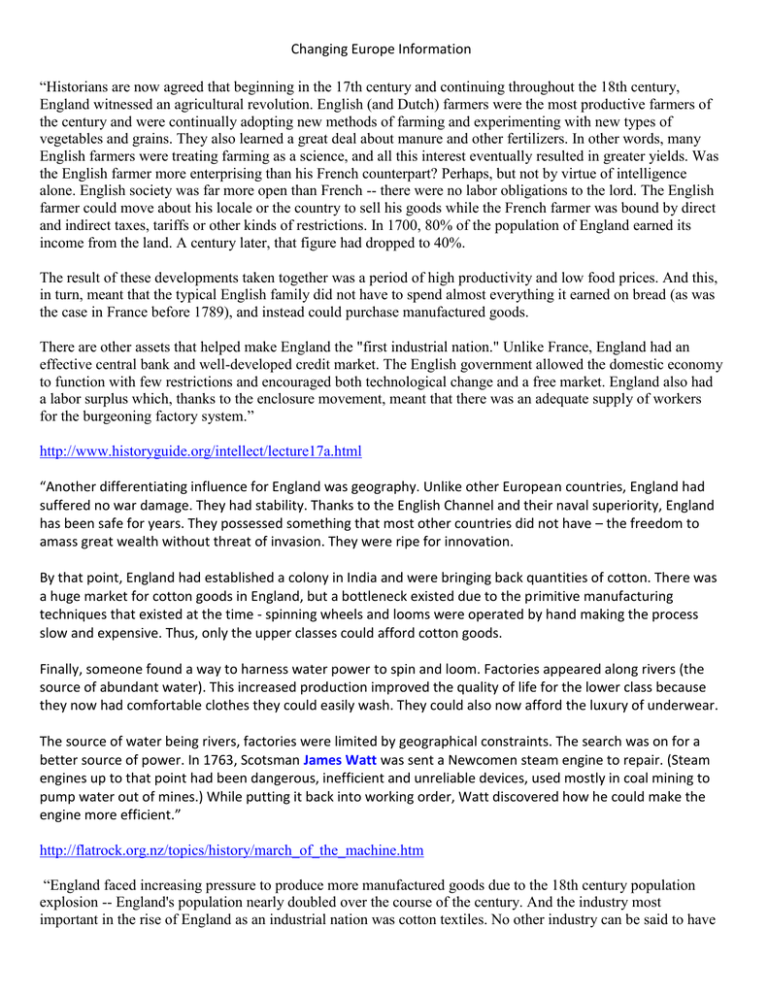
Changing Europe Information “Historians are now agreed that beginning in the 17th century and continuing throughout the 18th century, England witnessed an agricultural revolution. English (and Dutch) farmers were the most productive farmers of the century and were continually adopting new methods of farming and experimenting with new types of vegetables and grains. They also learned a great deal about manure and other fertilizers. In other words, many English farmers were treating farming as a science, and all this interest eventually resulted in greater yields. Was the English farmer more enterprising than his French counterpart? Perhaps, but not by virtue of intelligence alone. English society was far more open than French -- there were no labor obligations to the lord. The English farmer could move about his locale or the country to sell his goods while the French farmer was bound by direct and indirect taxes, tariffs or other kinds of restrictions. In 1700, 80% of the population of England earned its income from the land. A century later, that figure had dropped to 40%. The result of these developments taken together was a period of high productivity and low food prices. And this, in turn, meant that the typical English family did not have to spend almost everything it earned on bread (as was the case in France before 1789), and instead could purchase manufactured goods. There are other assets that helped make England the "first industrial nation." Unlike France, England had an effective central bank and well-developed credit market. The English government allowed the domestic economy to function with few restrictions and encouraged both technological change and a free market. England also had a labor surplus which, thanks to the enclosure movement, meant that there was an adequate supply of workers for the burgeoning factory system.” http://www.historyguide.org/intellect/lecture17a.html “Another differentiating influence for England was geography. Unlike other European countries, England had suffered no war damage. They had stability. Thanks to the English Channel and their naval superiority, England has been safe for years. They possessed something that most other countries did not have – the freedom to amass great wealth without threat of invasion. They were ripe for innovation. By that point, England had established a colony in India and were bringing back quantities of cotton. There was a huge market for cotton goods in England, but a bottleneck existed due to the primitive manufacturing techniques that existed at the time - spinning wheels and looms were operated by hand making the process slow and expensive. Thus, only the upper classes could afford cotton goods. Finally, someone found a way to harness water power to spin and loom. Factories appeared along rivers (the source of abundant water). This increased production improved the quality of life for the lower class because they now had comfortable clothes they could easily wash. They could also now afford the luxury of underwear. The source of water being rivers, factories were limited by geographical constraints. The search was on for a better source of power. In 1763, Scotsman James Watt was sent a Newcomen steam engine to repair. (Steam engines up to that point had been dangerous, inefficient and unreliable devices, used mostly in coal mining to pump water out of mines.) While putting it back into working order, Watt discovered how he could make the engine more efficient.” http://flatrock.org.nz/topics/history/march_of_the_machine.htm “England faced increasing pressure to produce more manufactured goods due to the 18th century population explosion -- England's population nearly doubled over the course of the century. And the industry most important in the rise of England as an industrial nation was cotton textiles. No other industry can be said to have advanced so far so quickly. Although the putting-out system (cottage industry) was fairly well-developed across the Continent, it was fully developed in England. A merchant would deliver raw cotton at a household. The cotton would be cleaned and then spun into yarn or thread. After a period of time, the merchant would return, pick up the yarn and drop off more raw cotton. The merchant would then take the spun yarn to another household where it was woven into cloth. The system worked fairly well except under the growing pressure of demand, the putting-out system could no longer keep up.” http://www.historyguide.org/intellect/lecture17a.html World War I “The after shocks of the earthquake we call the Great War are still being felt today, in the 21st century In countless ways, World War I created the fundamental elements of 20th century history. Genocide emerged as an act of war. So did the use of poison gas on the battlefield. The international system was totally transformed. On the political right fascism came out of the war; on the left a communist movement emerged backed by the Soviet Union. Reluctantly, but unavoidably, America became a world power. The British Empire reached its high point and started to unravel. Britain never recovered from the shock of war, and started her decline to the ranks of the second-class powers. At the peace conference of 1919, the German, Turkish, and Austro-Hungarian empires were broken up. New boundaries were drawn in Europe and the Middle East, boundaries -- as in Iraq and Kuwait -- which were still intact at the end of the century. Just as the war was ending, German Nationalists like Hitler gathered millions who rejected the peace and blamed Jews and Communists for their defeat. The road to the Second World War started there. Even after Germany's second defeat in 1945, the shadow of the Great War was still visible. Then came the shock waves of 1989-91, ending the "short 20th century," an era that began with the great war and concluded with the collapse of communism and the reunification of Germany in a robust European community. The German problem -- so central to World War I -- appeared to be resolved. But other problems have emerged that are disturbingly similar to those that plagued the world in 1914.” http://www.pbs.org/greatwar/thenandnow/index.html World War II “At the end of World War II, huge swaths of Europe and Asia had been reduced to ruins. Borders were redrawn and homecomings, expulsions, and burials were under way. But the massive efforts to rebuild had just begun. When the war began in the late 1930s, the world's population was approximately 2 billion. In less than a decade, the war between the Axis the Allied powers had resulted in 80 million deaths -- killing off about 4 percent of the whole world. Allied forces now became occupiers, taking control of Germany, Japan, and much of the territory they had formerly ruled. Efforts were made to permanently dismantle the war-making abilities of those nations, as factories were destroyed and former leadership was removed or prosecuted. War crimes trials took place in Europe and Asia, leading to many executions and prison sentences. Millions of Germans and Japanese were forcibly expelled from territories they called home. Allied occupations and United Nations decisions led to many long-lasting problems in the future, including the tensions that created East and West Germany, and divergent plans on the Korean Peninsula that led to the creation of North and South Korea and -- the Korean War in 1950. The United Nations Partition Plan for Palestine paved the way for Israel to declare its independence in 1948 and marked the start of the continuing Arab-Israeli conflict. The growing tensions between Western powers and the Soviet Eastern Bloc developed into the Cold War, and the development and proliferation of nuclear weapons raised the very real specter of an unimaginable World War III if common ground could not be found. World War II was the biggest story of the 20th Century, and its aftermath continues to affect the world profoundly more than 65 years later.” http://www.theatlantic.com/infocus/2011/10/world-war-ii-after-the-war/100180/
